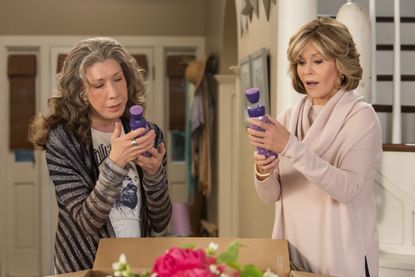Grace and Frankie needs a crisis
Now that the heroines seem to be done recovering from their respective divorces, the Netflix series has a problem


Grace and Frankie's third season, which drops March 24 on Netflix, starts slow. The lacerating crisis which structured its first two years — the discovery that four decades of marriage were a lie — is gone. While that doesn't make the series any less fun to watch, it does mean that the show's biggest challenge mirrors its protagonists': Its crisis is over, and it needs a new place to go to avoid stagnation.
Season three opens with Grace (Jane Fonda) and Frankie (Lily Tomlin) having mostly recovered from their respective divorces from Robert (Martin Sheen) and Sol (Sam Waterston). The series' premise — two septuagenarian couples recombine when the men come out and marry each other — has thus entered a new phase, one in which the women are in danger of stalling out and the men are becoming irrelevant.
That wasn't true before: Grace and Frankie's first season ended with a disastrous and wholly believable sexual reconciliation between Frankie and Sol. The second season ended with defiance: Betrayed yet again when confronted with the patronizing patterns that structured their respective marriages, Grace and Frankie articulated their outrage, asserted their own sexual needs, and announced they were going into business together.
Subscribe to The Week
Escape your echo chamber. Get the facts behind the news, plus analysis from multiple perspectives.

Sign up for The Week's Free Newsletters
From our morning news briefing to a weekly Good News Newsletter, get the best of The Week delivered directly to your inbox.
From our morning news briefing to a weekly Good News Newsletter, get the best of The Week delivered directly to your inbox.
Those crises made for great television. When the series really dug into what it means to lose a partner of 40 years, there was little like it. I'll never forget the moment in season one when Frankie leaves a funeral and unthinkingly gets into her Sol's car, belatedly realizing that he's there for Robert (Martin Sheen). Those somber, disorienting moments did a lot to anchor the show's preference for the silly and light — for Frankie driving Grace crazy with her hippie-hood and Robert and Sol flirting gently.
Yet now enough has been resolved that the series suffers from a lack of tension.
Grace and Frankie's friendship is too new to sustain some of the aerobic plotting to which it's subjected, and the husbands are just too happy to be especially entertaining. There's a telling moment when Sol and Robert are giving the children a tour of their empty new home that captures the viewer's relationship to the gents this season. Robert points out the kitchen and dining rooms, but the kids can't focus on him long enough for him to finish a single sentence. It turns out anything is more interesting than Sol and Robert's newfound (and totally self-involved) life together. The kids feel this as keenly as we do, and it really is a problem the show will have to solve if it's going to keep Sheen and Waterston in the cast.
As for the children themselves, Bud, Brianna, Mallory, and Coyote seem mostly deployed to keep Robert and Sol in the picture, leaving their subplots woefully rushed and undercooked. For all the comic relief and vaguely incestuous sexual chemistry Bud and Brianna reliably provide, when serious stuff crops up — it was hinted last season that Mallory (Brooklyn Decker) aborted Coyote's baby — those giant revelations go nowhere.
Yet Grace and Frankie's third season still shines in places.
Jane Fonda and Lily Tomlin remain a terrific odd couple. In fact, they're so good it almost creates another problem for the show: Their youthfulness sometimes fights against the series' objective of highlighting the indignities and challenges of aging. Tomlin's Frankie is supposedly going deaf, but the show only intermittently remembers that. Usually, she's dancing around with an agility millennials would envy. The same is true of Fonda's Grace: Despite her osteoarthritis, she's so poised, fit, and well-coiffed that it's genuinely shocking when a police officer tells her that her only defense against an attacker is to soil herself. Grace and Frankie might be repeatedly saddled with people's prejudicial treatment of the aged and infirm and divorced, but the camera sees these women as they see themselves. They're vital, even (to borrow the name of their joint business) Vybrant.
And season three still has those asides. Though Grace and Frankie has been rightly criticized for clunky dialogue — and there's plenty of that still — the show's use of throwaway lines really is brilliant. Bud absently praising the "feng shui" of Robert and Sol's new house (which is empty) is one of my favorite moments on television, and the drinking game the kids play while getting to know Bud's new girlfriend is the kind of communal in-joking this show does better than most. When it comes to manufacturing a sense of intimacy that's otherwise not evident — particularly among the children, who don't get much screen time — those tiny gestures do yeoman's work.
As for the problem of the show's fading premise, there's still hope. Season three's first few episodes do a lot to let the children — who have been satellites at best — into a plot that in previous seasons almost exclusively focused on the parents' generation. Turning toward the kids could energize the show now that the husbands are receding into a comfortable middle distance.
Grace and Frankie's third season begins as a comedy in search of a crisis. If it can build a new set of stakes, that's not necessarily a bad thing.
Create an account with the same email registered to your subscription to unlock access.
Sign up for Today's Best Articles in your inbox
A free daily email with the biggest news stories of the day – and the best features from TheWeek.com
Lili Loofbourow is the culture critic at TheWeek.com. She's also a special correspondent for the Los Angeles Review of Books and an editor for Beyond Criticism, a Bloomsbury Academic series dedicated to formally experimental criticism. Her writing has appeared in a variety of venues including The Guardian, Salon, The New York Times Magazine, The New Republic, and Slate.
-
 The hunt for Planet Nine
The hunt for Planet NineUnder The Radar Researchers seeking the elusive Earth-like planet beyond Neptune are narrowing down their search
By Chas Newkey-Burden, The Week UK Published
-
 Magazine interactive crossword - April 26, 2024
Magazine interactive crossword - April 26, 2024Puzzles and Quizzes Issue - April 26, 2024
By The Week US Published
-
 Magazine solutions - April 26, 2024
Magazine solutions - April 26, 2024Puzzles and Quizzes Issue - April 26, 2024
By The Week US Published
-
 Walter Isaacson's 'Elon Musk' can 'scarcely contain its subject'
Walter Isaacson's 'Elon Musk' can 'scarcely contain its subject'The latest biography on the elusive tech mogul is causing a stir among critics
By Theara Coleman Published
-
 Welcome to the new TheWeek.com!
Welcome to the new TheWeek.com!The Explainer Please allow us to reintroduce ourselves
By Jeva Lange Published
-
 The Oscars finale was a heartless disaster
The Oscars finale was a heartless disasterThe Explainer A calculated attempt at emotional manipulation goes very wrong
By Jeva Lange Last updated
-
 Most awkward awards show ever?
Most awkward awards show ever?The Explainer The best, worst, and most shocking moments from a chaotic Golden Globes
By Brendan Morrow Published
-
 The possible silver lining to the Warner Bros. deal
The possible silver lining to the Warner Bros. dealThe Explainer Could what's terrible for theaters be good for creators?
By Jeva Lange Last updated
-
 Jeffrey Wright is the new 'narrator voice'
Jeffrey Wright is the new 'narrator voice'The Explainer Move over, Sam Elliott and Morgan Freeman
By Jeva Lange Published
-
 This week's literary events are the biggest award shows of 2020
This week's literary events are the biggest award shows of 2020feature So long, Oscar. Hello, Booker.
By Jeva Lange Published
-
 What She Dies Tomorrow can teach us about our unshakable obsession with mortality
What She Dies Tomorrow can teach us about our unshakable obsession with mortalityThe Explainer This film isn't about the pandemic. But it can help viewers confront their fears about death.
By Jeva Lange Published